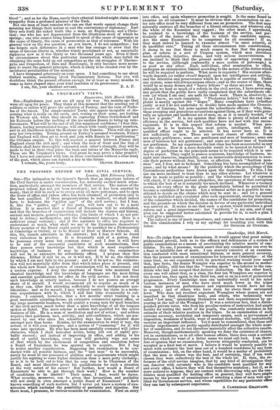Cambridge, 16th March.
Sm—To judge from recent discussions, it would appear that great misap- prehensions prevail, both as to the efficacy and deficiencies of a system of public examinations as a means of ascertaining the relative merits of can- didates. No one, I presume, would assert that any examination can ever be a final or infallible test of merit. I can scarcely conceive of an examina- tion conducted with more intentional fairness, or more general accuracy, than the present system of examinations for honours at Cambridge : at the same time, no one acquainted with its practical working would ever assert that, ipso facto, the Senior Wrangler was superior to the second in mathe- matical ability, still less that the "wooden spoon" was inferior to the can- didate who had just escaped that dubious distinction. On the other hand, every one will admit that, as a class, the first ten Wranglers are superior to the second ten, they again to the third ten, and so on in a sort of geometrical progression. Every Cambridge man can undoubtedly recall to his mind various instances of men who have stood much lower in the tripes than their previous performances and reputations would have led one to expect ; and of others who have risen far above their anticipated level. Who does not recollect expectant Wranglers whose names are not inscribed in that illustrious body, and others, who technically were called "low men," astonishing themselves and their acquaintances by ap- pearing in the tail of the Wranglers ? It was a notorious fact, that a distin- guished private tutor, who from his peculiar system of instruction had ample facility for testing the merit of his pupils, was constantly mistaken in his estimate of their relative position in the tripos. In an examination of such extreme accuracy, accidental and temporary causes, such as nervousness of disposition, weakness of health, want of manual dexterity, will undoubtedly exercise an important influence. Yet it must be remembered, that these and similar impediments are pretty equally distributed amongst the whole num- ber of candidates, and do not therefore materially affect the collective results. Moreover, though mathematically speaking we deny the existence of chance, yet in examinations, as in all other human affairs, there does exist a certain influence which for want of a better name we must call luck. I am there- fore of opinion that no examination, however stringently conducted, can be accepted as a final test of merit. I believe it would be scarcely possible to select with certainty the beat man out of a hundred candidates by any form of examination ; but, on the other hand, it would be a matter of probability that the man so chosen was the best, and of certainty, that if ten were chosen they were collectively the best of the whole lot. If, then, the re- formers of the civil service imagine, that by any kind of investigation they can discover with certainty who is the candidate most qualified for any and every office, I believe they will find themselves mistaken ; but if, as 1S more natural to suppose, they are content with discovering who are the can- didates most qualified for holding office in general, they will have ample means by the process of examinations of selecting a class of men well qua- lified for Government service, and whose capabilities for any particular office they can test by subsequent experience. A CAXBRIDGB.GRADUATIL


































 Previous page
Previous page